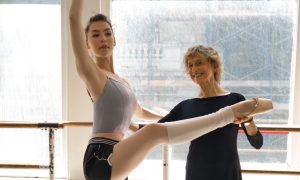Social media – there’s no denying that it’s an omnipresent and powerful force in the world of 2017. It facilitates advertising, social connections, information sharing and more. But are there costs and dangers? Is it beginning to change how we communicate and interact? It’s ubiquitous to the point where there’s a platform of it for nearly everything – payments (Venmo), professional networking (LinkedIn), quick thoughts (Twitter), favorite images (Pinterest).
Dance is, most generally, a visual art form. An image can’t completely capture its in-real-time magic, yet it can offer an idea of that. Instagram is allowing many dance artists to get their names and faces out there to the general public, and through that offer followers a sneak-peek into the dance world itself. It also allows artists to build brands through which they can secure dance company, sponsorship and modeling contracts. The social media platform can also help bring attention to social movements and efforts through dance. Further visibility through each participant’s individual account can multiply that effect.

Vanessa Long. Photo courtesy of Long.
Vanessa Long of Vanessa Long Dance Company affirms the importance of social media for dance companies as well. She describes how people will often visit a company’s social media accounts before visiting a website. “Social media is also a great way to get out information to a company’s followers, so that people know what projects are happening,” Long says. “I believe without social media, audiences would be less likely to engage with companies as they currently are.” She’s fairly confident that her dance company wouldn’t be where it is today without the sponsorship funding obtained through Instagram.
Kimberly Giannelli, vice president of In The Lights PR, notes how those who focus on social media in their branding nowadays obtain notably more opportunities than those who don’t. “[Corporate sales] companies want to see the numbers [of followers],” she affirms. Giannelli describes how certain clients, such as American Ballet Theatre’s James Whiteside, now have companies coming to them with contract deals. It’s only possible through social media.
It has to be authentic to resonate with followers, however, she notes. “People love to see the behind-the-scenes, but if you’re not honest and authentic, it’s probably not going to work out too well for you,” Giannelli says. She describes how other dance professionals, such as Kathryn Morgan, are offering a lot of free, informative and helpful content through Instagram and other social media platforms. Apart from getting their names out there, this is a great public service, as well as one for the art of dance.
When it comes to getting jobs, it does matter to stay on top of the social media “game”. Giannelli reminds us of how social media is changing month to month, sometimes on some platforms week to week. Dance companies and their artistic directors are tuned into that, she says. The branding of a student should be different from that of a professional. If you’re making that shift, so should your social media, Giannelli notes.

Kimberly Giannelli.
Along with that is caution about the nature of what you post; even if you delete or untag yourself in something that you wouldn’t want an employer (or potential future employer) to see, it’s searchable somewhere, Giannelli affirms. Avoid posting anything promiscuous or risqué as to not give followers – some who might not have the best intentions – the wrong idea about you.
All of that aside, yes, dancers out there have gotten jobs from their social media accounts, she confirms. At the end of the day, however, what truly matters is what makes you a dancer and an artist – your work ethic, creativity, ability to be a team player and your willingness to try something new.
“Stay rooted in your training and goals; let social media be a tool, not a main focus,” Giannelli urges.
In addition, Long states, “A dance company’s worth does not lie in how many followers it has, nor does it state the value of a choreographer’s work….[or] a dancer in terms of how they work with other people.” Like Giannelli, she sees social media as a “great tool, but that’s all it is – a tool.” Regarded that way, it’s less likely to alter who you really are – your values, the way you interact with others, how you feel about yourself, how you respond in difficult situations.
“[Social media] is our new way of communicating,” Giannelli says. “You have to be flexible with it and play the game. But never let it compromise who you are.” Find times to separate from your phone. When you’re in class or rehearsal, have that be your sole focus. For example, Giannelli teaches high-schoolers ballet, and she has a basket for everyone’s phone – to be placed there from when they walk into class to when they walk out.
Remember also that as you gain more followers, you’re not only further branding yourself and building contract opportunities – you’re a role model. Younger dancers and dance lovers are looking up to you. Be gracious – acknowledge and thank teachers, choreographers and dance partners/castmates. Promote your company and shows, not just yourself. Focus on artistry. Keep confidential what should be confidential.
“Realize the impact of what you’re doing and why,” Giannelli says. “At the end of the day, you can only control yourself. Do that with integrity.”
By Kathryn Boland of Dance Informa.













